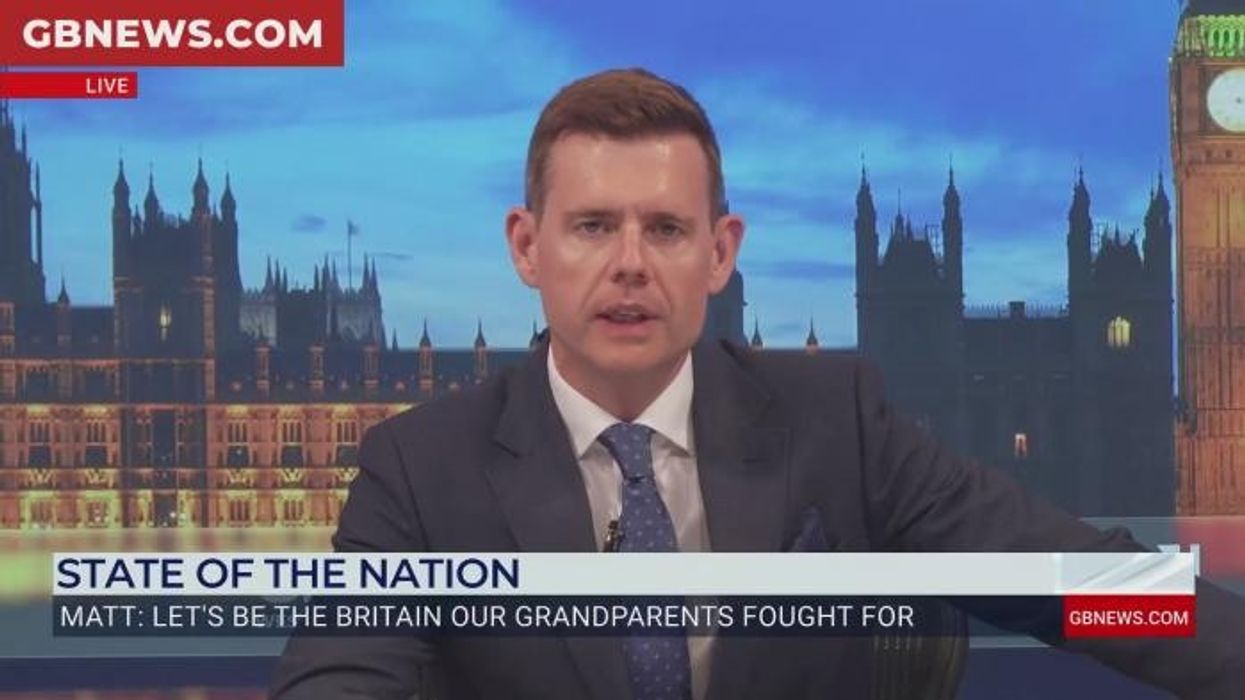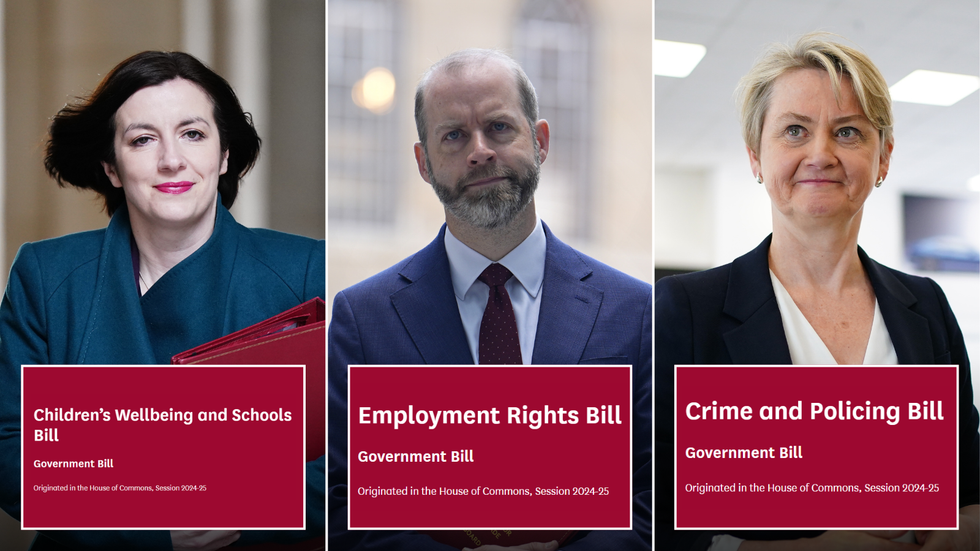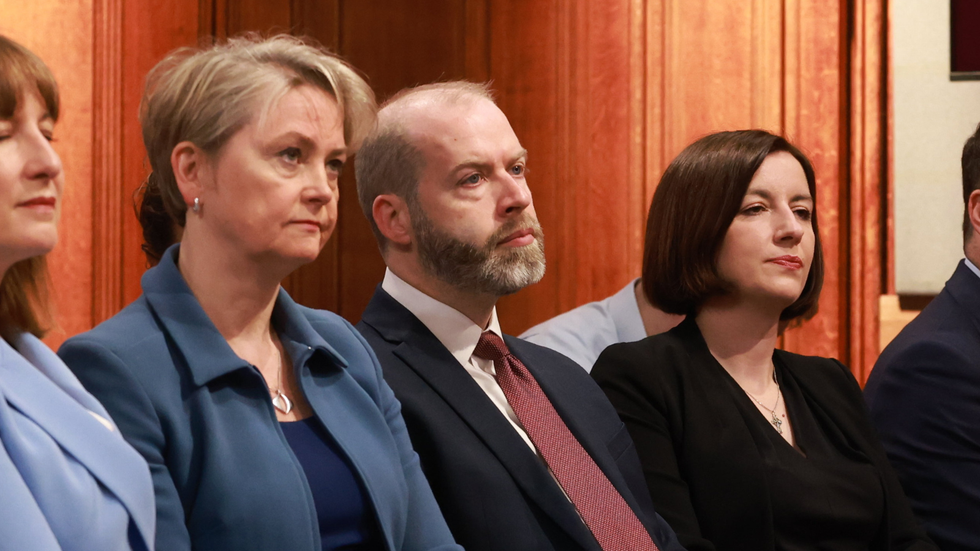EXPOSED: Labour quietly pushing through three Bills that threaten free speech as all eyes on benefits cuts

WATCH: Matt Goodwin speaks about the state of play surrounding free speech in Britain
|GB NEWS

Free speech advocates are sounding the alarm over three crucial pieces of legislation that could soon be the law of the land
Don't Miss
Most Read
Trending on GB News
A multi-pronged assault on free speech is currently underway in Britain, campaigners have warned.
With all eyes on Labour's benefits Bill turmoil, three pieces of legislation - each from a different seat around Sir Keir Starmer's Cabinet table - are rumbling through the Lords, with every one closer to becoming the law of the land than the last.
As the Bills make their way through the second chamber of Parliament, here's a closer look at each one and what's at stake.

Three crucial pieces of legislation could soon be the law of the land - but critics have warned they could skewer freedom of expression
|PA
The Crime and Policing Bill
Yvette Cooper's Crime and Policing Bill is awaiting its second reading in the Lords following its first on June 19.
The Bill is couched inside Labour's manifesto "mission" to make Britain's streets safer - but opponents say it will impose curbs on freedom of expression.
It would, if passed into law, scrap limits on recording non-criminal hate incidents (NCHIs) - which Free Speech Union director Lord Young labelled "bonkers".
"The idea that forcing the police to spend more time investigating 'non-crime' is going to reduce actual crime is bonkers," he spat.
Shadow Home Secretary Chris Philp said that he would move to amend the Bill in order to make it illegal in almost all circumstances for the police to collect or retain personal data relating to "hate incidents" where no laws have been broken.
That eventually came to pass through an amendment by Tory MP Matt Vickers - but was not considered by the Commons.
Andrew Tettenborn, a law professor at the University of Swansea, wrote for Spiked that the Bill could soon "silence anyone who says anything online that the authorities disapprove of", adding: "If it passes, all the police would have to do is persuade a county court judge that people are distressed by the post in question.
"Then, the poster can be compelled, on pain of prosecution, to delete the offending content, not refer to the subject concerned online again and even stay off social media altogether.
"They might even be forced to provide an official with the passwords to all of their internet-enabled devices."
TOP STORIES ON FREE SPEECH - READ MORE:
- Toby Young’s plan to SAVE free speech in Britain as he pinpoints exactly where line should be drawn - WATCH
- Free speech ‘under threat’ as Home Office branded ‘Orwellian’ over extremism guidance: 'Are we all terrorists now?'
- Meet the groups leading the free speech fight-back against Britain's 'institutionally captured' universities
- Free speech is a precious right - but not an absolute one - Nigel Nelson

Yvette Cooper, Jonathan Reynolds and Bridget Phillipson have all sponsored Bills which the Free Speech Union warns are imperilling freedom of expression
|PA
The Children's Wellbeing and Schools Bill
Bridget Phillipson's Children's Wellbeing and Schools Bill sits one stage further on than Cooper's in the Lords, having been sitting at committee stage since late May.
A particular point of contention is the Bill's Clause 44 which could see parents fined or even jailed if authorities disapprove of their "home education" approach.
If passed, Parents would be required to seek local authority consent to remove a child from the state education system for the first time.
Critics fear parents would be forced to send their children through an education system which they view as increasingly censorious and illiberal - thus policing their ideas and speech.
Aime Miles, a campaigner with the Home Education Alliance, said the Bill was a cause for major concern among families who believe local authorities could force their children to attend school.
She told the BBC: "There are an awful lot of families who say they feel terrified, some are crippled with anxiety over this.
"It's becoming a very horrible situation where we distrust parents to parent. What we should be doing is supporting them in whatever decision they've made for the benefit of their child."
Again, Toby Young - a Tory peer - has been at the centre of the debate on this.
Speaking at the Bill's second reading in the Lords, he pointed out how "successful the education reforms [are that] the Government wants to reverse" and urged it to be guided by "evidence not ideology".

Toby Young has warned that Labour's Employment Rights Bill would amount to a 'banter ban'
|PA
The Employment Rights Bill
Jonathan Reynolds's Employment Rights Bill is the "worst of the three", according to Lord Young.
It's also the closest of the three to receiving Royal Assent and passing into law. Only its third reading in the Lords stands in the way.
It has been widely panned by the Tories - one, Andrew Griffith, has called it the "unemployment rights bill" and has warned that it would uproot "decades of settled employment law that could see Britain remade as one of the worst places to employ people".
But according to the FSU, its consequences on free speech could be dire.
Writing for GB News, Young warned it would "ban banter in pubs, restaurants, bars, entertainment venues and football stadiums".
He explained: "The Bill's Clause 20 will impose a legal duty on employers to 'take all reasonable steps' to prevent their employees being 'harassed' by third parties, meaning they could be sued by their employees in the Employment Tribunal if they don’t do enough.
"Among other things, it will include conversations between customers or members of the public that are overheard by employees - not directed at them - and which they find offensive in virtue of one or more 'protected' characteristic."
He added: "Not just their own, mind you. Under Labour's new law, employees will be able to take offence on behalf of one of their colleagues"...
More From GB News










